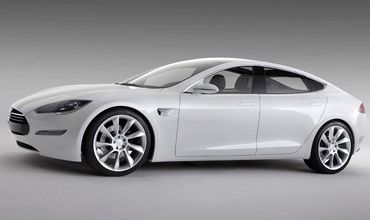According to the Michigan Film Commission Facebook page, 35 feature films were shot in the state in 2008. This, as Variety reports feature film location shoots in Los Angeles dropped 56% in the first quarter of this year. Meanwhile, American auto manufacturing is fleeing Detroit, and the home of the future of the American auto industry is California.
Tesla Motors of San Carlos, California is presently making the first all-electric, plug-in lithium battery production car, and recently unveiled its stunning all-electric sedan (see above). And the Tesla S will be built in Los Angeles, with a projected delivery date in 2011.
Tesla owns the patents on uniquely fast-charging and long-range battery technology, but they didn't have enough capital to start building their sedan. In July, Daimer, AG, the maker of Mercedes Benz and Smart cars, bought 10% of Tesla, infusing the fledgling carmaker with a $50 million investment (in return for which they gain the right to Tesla's battery for their all-electric Smart). With that vote of confidence, the Dept. of Energy granted Tesla a low-interest loan of $465 million. The Daimler cash infusion and government loan will enable Tesla to have their sedan in showrooms in late 2011. Step up to that, Detroit (please).
Fisker Motors is based in Irvine, California. Fisker's first car, the very sexy plug-in hybrid Karma sedan will be made of 65% American-made parts, but is to be assembled in Finland (really), and should be on sale next year (for $90,000.). Today, the Obama administration announced that Fisker will receive a $528.7-million low-interest loan from the Department of Energy's stimulus funds. This loan will enable Fisker to begin work on their second offering, a $45,000. family sedan to be made (tentative scheduling) in Michigan. Still, their design factory is in California.
Of course California is already home to design facilities for all the major Japanese manufacturers, as well as Volkswagen/Audi. Ironically, Ford aborted its attempt to move their Lincoln/Mercury division to California after five years (1998-2002). Perhaps they should reconsider.
Meanwhile, as the Michigan is fiercely competing for more film production by offering 42% tax rebates to production companies, one of the oldest and largest prop houses in Los Angeles, 20th Century Props is going out of business and auctioning off its entire inventory of some 70,000 items.
The upside down balance shift of iconic industries such as Automobiles and Motion Picture Production is a trip through the looking glass, and has happened relatively quickly. But the business model of these new car companies is what's most stunning. The turnaround time from design to manufacture is a fraction of GM's tradition. The last model released by GM's soon-to-be dead Pontiac division was the Solstice Coupe, which hit showrooms in April 2009. The Solstice Coupe had been introduced (in its final form) at the auto shows in the Fall of 2002 - and GM bragged about it in their advertising! No wonder they let Pontiac go. If what's good for GM is good for America, this new competition is most welcome, as is the oversight that comes from the government's temporary custody of the ailing giant.
Similarly, California must feel the heat and compete to bring film production back. If tax breaks for production companies and slashing location permit fees for film shoots is what it takes, it's time to make a dramatic move to bring back all the drama (and the comedies, musicals and action flicks). There are hundreds of thousands of jobs and thousands of small businesses (like the aforementioned prop house) at stake in California, just as there are millions of jobs at stake if GM, Ford and Chrysler don't match the efficiencies of Tesla and Fisker ├ ?? and do it by polishing the rust off the Rust Belt.
Go ask Alice.





